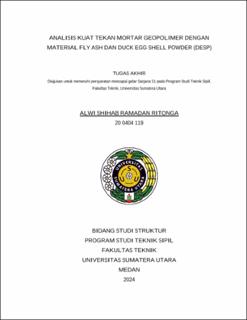Analisis Kuat Tekan Mortar Geopolimer dengan Material Fly Ash dan Duck Egg Shell Powder (DESP)
Analysis of Compressive Strength of Geopolymer Mortar with Fly Ash and Duck Egg Shell Powder (DESP) Materials

Date
2024Author
Ritonga, Alwi Shihab Ramadan
Advisor(s)
Karolina, Rahmi
Metadata
Show full item recordAbstract
It is projected that the Portland cement industry will contribute about 7% of the world's total CO2 emissions, thereby reducing the amount of greenhouse gases released into the atmosphere. The carbon dioxide emissions produced by alkali activated cement are much lower, about 50-80%, compared to ordinary Portland cement. To achieve environmentally friendly concrete, one environmentally friendly innovation is geopolymer as a cement replacement material. Geopolymer mortar is a mortar mix where the base material uses materials that have a high silica oxide and alumina content such as fly ash and Duck Egg Shell Powder (DESP) as a binder and is activated with a combination of sodium hydroxide (NaOH) and sodium silicate (NaSiO)) as the activator solution. The objective of this study was to determine the optimum mix of geopolymer mortar using fly ash and DESP as base materials. In this research, 0%, 10%, 30%, 50% variation of DESP substitution on fly ash and SM, 12M, 16M NaOH molarity variation were used. The mortars were moulded with 5x5x5 cm triangles and left at room temperature and tested after 7, 14, and 28 days of age. From the research results, the highest compressive strength was obtained by geopolymer mortar with Fly ash variation 100%, Duck Egg Shell Powder (DESP) 0%, NaOH 16 M at the age of 28 days at 55 MPa. The minimum compressive strength results occurred in mortar variation FES5S12 (Fly ash 50%, Duck Egg Shell Powder 50%, NaOH 12M) at the age of 28 days with a compressive strength value of 10,8 MPa
Collections
- Undergraduate Theses [1512]
